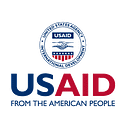Tajikistan Health Workers Fight COVID-19 With Knowledge
Training empowers a health manager

As head of a village health center in Tajikistan’s Mastchoh district, Gulsunmoh Abdulloeva is responsible for ensuring basic services are delivered with quality and on time. But watching COVID-19 ravage her community during the pandemic made her feel anxious and powerless. She and fellow health workers had little understanding of this new disease or how to slow its spread.
That changed when Gulsunmoh and her team began receiving training from the Tajikistan Ministry of Health and Social Protection of the Population, through the support of USAID’s Local Health System Sustainability Project. The training on infection prevention and control and COVID-19 vaccines gave them crucial information about the disease and ways to help their communities.
“Attending the training on COVID-19 infection control reshaped my mind and vision of my daily work,” said Gulsunmoh. “Before knowing anything about this new disease and its prevention, control, and treatment, I was useless to my patients. After the training, I got my confidence back and applied my knowledge and skills to support my community in Mastchoh district.”
“As health care workers, we know our communities best and can help save lives when we have the best training and information.” — Gulsunmoh Abdulloeva
Gulsunmoh also benefited from watching LHSS-developed educational TV programs about COVID-19 that were broadcast across Tajikistan. The TV shows gave Gulsunmoh ideas about how to approach people in the Mastchoh community, where many residents viewed the pandemic from a religious perspective, seeing it as a test from God.
She and her team designed a plan that matched the local understanding and perceptions around COVID-19 vaccines. Using her new skills, Gulsunmoh began counseling families, pregnant women, school children, and other community members on ways to protect themselves and others from COVID-19. She raised awareness about the importance and effectiveness of vaccination, especially for at-risk groups such as people with diabetes or heart disease, pregnant women, and those 65 and over. She shared informational materials that helped shift negative attitudes and anxiety.
Gulsunmoh was also particularly moved to help reduce the social isolation of those affected by COVID-19. She recalls a family suffering from severe COVID-19 in a distant village. Neighbors set food at the family’s doorstep, but immediately left before the door opened. Besides the generosity of meals, the family craved emotional support from their community. That story became a catalyst for Gulsunmoh to start an outreach campaign for seniors suffering from COVID-19 focused on prevention counseling and mental support via voice messages and phone calls.
Greater vacccine coverage
Through Gulsunmoh Abdulloeva’s leadership of these and other efforts, the Mastchoh district went from 65 percent vaccine booster coverage to 97 percent coverage for the first booster and 76 percent for the second booster within one year. Altogether, 1,617 people aged 18 and over received vaccinations. In recognition of the accomplishment, Tajikistan’s Ministry of Health selected Gulsunmoh for its ‘Best health care worker’ award in December 2022.
“Thanks to the LHSS informational initiatives and educational campaigns, I was able to achieve more through our partnership with USAID. The support helped me to strengthen my community’s positive perceptions and behavioral attitudes towards vaccinations and COVID-19,” reflected Gulsunmoh.
“No one should have to suffer from a disease that vaccines can safely prevent. Not a single. As health care workers, we know our communities best and can help save lives when we have the best training and information.”
